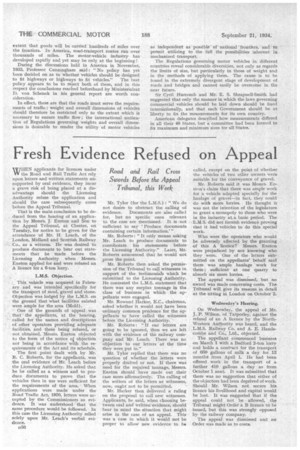Fresh Evidence Refused on Appeal
Page 114

If you've noticed an error in this article please click here to report it so we can fix it.
Road and Rail Cross Swords Before the Appeal Tribunal, this Week
WHEN applicants for licences under VV the Road and Rail Traffic Act rely upon letters and written statements unsupported by oral evidence, they incur a grave risk of being placed at a disadvantage should the Licensing Authority refuse the application and should the case subsequently come before the Appeal Tribunal.
That is the main conclusion to be deduced from the hearing of an application by Messrs. 'J. Enston and Son' to the Appeal Tribunal, at Chester, on Tuesday, for notice to be given for the attendance of Mr. H. Leach, of the London, Midland and Scottish Railway Co„ as a witness. He was desired to produce documents to bear out statements that he made before the Licensing Authority when Messrs. Enston applied for and were refused an
A licence for a 6-ton lorry.
L.M.S. Objection.
This vehicle was acquired in February and was intended specifically for the transport of sand, gravel and stone. Objection was lodged by the L.M.S. on the ground that what facilities existed were ample for the area (Mold).
• One of the grounds of appeal.. was•that the appellants, at the hearing,'
called for the 'names and descriptions of other operators providing adequate facilities, and these being refused, or not,obtained, Messrs. Enston objected to the form of the notice el objectidn not being in accordance with the requirements of the Act and its schedule.
The first point dealt with by Mr. R. C. Roberts, for the appellants, was the oral evidence of Mr. Leach before the Licensing Authority. He asked that he be called as a witness and to produce documents to prove that the vehicles then in use were sufficient for the requirements of the area. • When applications were made under the Road Traffic Act, 19n. letters were accepted by the• Commissioners as evidence. It was understood that the same procedure Would be followed. In this case the Licensing Authority relied solely upon Mr. Leach's verbal evidence.
.n56 Mr. Tylor (for the L.M.S.) : " I.Ve do not desire to obstruct the calling of evidence. Documents are also called for, but no specific ones relevant to "the case are mentioned. It is -not sufficient to say ' Produce documents containing certain information."
Mr. Roberts: "It only means asking Mr. Leach to produce documents to corroborate, his statements before• the Licensing Authority." Later, Mr. Roberts announced that he would not press the point.
Mr. Roberts then asked the permission of the Tribunal to call witnesses in support of the testimonials which he submitted to the Licensing Authority. He contested the L.M.S. statement that there was any surplus tonnage in the class of business in which the appellants were engaged.
Mr. Rowand Harker, K.C., chairman, asked whether it would not have been ordinary common prudence for the appellants to have called the witnesses before 'the Licensing Authority.
Mi. Roberts: "If our 'letters are going to be ignored, then we are left with the evidence of the railway company and Mr. Leach. There was no objection to our letters at the time they were put in."
Mr. Tylor replied that there was no question of whether the letters were properly drafted or not. If there was need for the required tonnage, Messrs. Enston should have made out ,their case more affirmatively. The calling of the writers of the letters as witnesses, now, ought not to be permitted.
Mr. Harker then delivered a ruling on the proposal to call new witnesses. Applicants, he said, when choosing between oral and written evidence, should bear in mind the situation that might arise in the case of an appeal. This was a case in which it would not be proper to allow new evidence to be called, except on the point of Whether the vehicles of two otlier owners were suitable for the conveyance of gravel.
Mr. Roberts said it was Messrs. Efiston's claim that there was ample: work for a vehicle adapted specially for the haulage of gravel—in fact, they could do with more lorries. He thought it was not the intention of the legislature to grant a monopoly to those who were in the industry at a basic period. The -L.M.S. did-not furnish evidence proving that it had vehicles to do this special
work. .
Who were the operators who would be adversely .affected by the granting of this A licence? Messrs. Enston were prejudiced by not knowing who they were. One of the letters submitted on the appellants' behalf said there was ample haulage work for them; sufficient at one quarry to absorb six more lorries.
The appeal was dismissed, but no award was made concerning costs. • The Tribunal will give its 'reasons in detail at the sitting in London' on October 2.
Wednesday's Hearing.
On Wednesday, the appeal of Mr. J. P. Wilson, of Tarporley, against the refusal of an A licence by the NorthWestern .Authority was heard, and the RailWay Co. and A. E. Handseombe and Co., Ltd., objected.
The appellant commenced business on March 1 with a Bedford 2-ton lorry and holds a contract for the transport of 650 gallons of milk a day for 12 rnonthe from April 1. Ile had been offered work in the transport of a further 410 gallons a day as from October 1 next. It was submitted that there was no suggestion that either of the objectors had been deprived of work. Should Mr. Wilson not secure his licence his livelihood and capital would he lost. It was suggested that if the appeal could not be allowed, the Tribunal might Order a B licence to be issued, but this was strongly opposed by the railway company.
The appeal was dismissed and no Order was made as to costs.








































































































































































